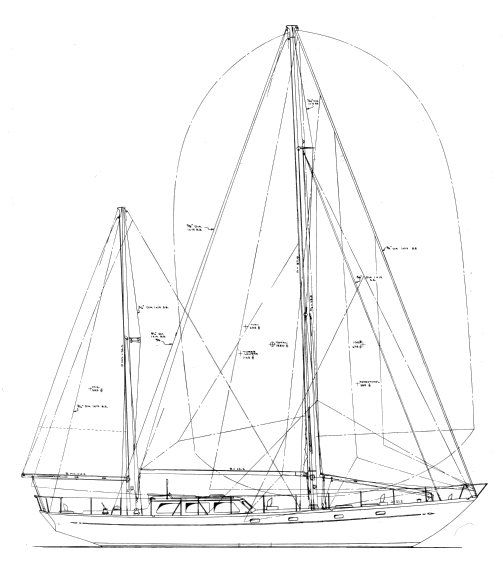The Alden Boothbay Challenger is a substantial ketch-rigged monohull, conceived as a robust and comfortable offshore cruiser. Designed by the esteemed John G. Alden, known for his able auxiliary cruisers, and built by the venerable Hodgdon Bros. of East Boothbay, Maine, this vessel represents a marriage of classic naval architecture with the emerging fiberglass construction techniques of its era. With a limited production run, the Boothbay Challenger has garnered a reputation as a heavy-displacement yacht built for serious passage making, offering a blend of traditional aesthetics and a seaworthy disposition.
Boothbay Challenger (Alden) Information, Review, Specs

- Make
- Alden
- Model
- Boothbay Challenger
- Number Built
- 14
- Production Year(s)
- 1968 - 1976
The Alden Boothbay Challenger, Alden design #1011, commenced production in 1968 and continued until 1976, with only 14 units built by Hodgdon Bros.. During this period, John G. Alden's design philosophy emphasized the creation of able auxiliary cruisers, balancing traditional form with practical performance. The Hodgdon shipyard, renowned for its custom craftsmanship since 1816, began a transition to fiberglass construction in the 1960s, while maintaining its commitment to high-quality, custom building. This collaboration resulted in a fiberglass yacht that still embodied the meticulous standards of a yard historically rooted in wooden boatbuilding. The Boothbay Challenger was offered with either a center or aft cockpit, though most were delivered with the former, and notably featured a tandem centerboard system for versatile performance across varying depths.
Sailing Performance and Handling
With a length overall of just under 59 feet and a waterline length of 41 feet, the Boothbay Challenger is characterized by its heavy displacement, tipping the scales at 53,300 lbs. This weight class places it firmly in the category of a traditional cruiser, with a Displacement to Length ratio of approximately 345, indicating a boat designed for comfort and stability in offshore conditions rather than outright speed. The Sail Area to Displacement ratio of about 17.3 suggests a reasonably good performer for its size, capable of moving well in a range of wind conditions, though not designed as a light-air flyer.
The ballast to displacement ratio, around 0.22, is relatively low, indicating that the Boothbay Challenger may not be as stiff as some designs, potentially requiring earlier reefing in stronger winds. However, this characteristic often translates to a more comfortable and less abrupt motion in a seaway, a desirable trait for long-distance cruising. Owners generally describe it as a heavy, reasonably performing sailboat with excellent righting capability despite its moderate initial stiffness. The keel/centerboard configuration, including its tandem centerboards, provides flexibility in managing draft, an advantage when navigating shallower waters while still offering substantial lateral resistance for upwind performance when the boards are deployed.
Accommodations and Layout
Given its considerable length and beam of over 15 feet, the Alden Boothbay Challenger offers generous interior volume, though specific detailed layouts are not widely published. Many models were built with a deck saloon configuration, which would typically afford panoramic views and an abundance of natural light within the main living area. Owners can expect a classic interior finish, likely featuring extensive wood trim and cabinetry, consistent with the high-end custom build ethos of Hodgdon Yachts during its production years. While detailed information on the number of berths, galley specifics, or head arrangements is scarce, the design's purpose as an offshore cruiser implies comfortable sleeping arrangements, a functional galley capable of sustained use, and ample storage for provisions and gear.
Owner's Perspectives
Owners of the Alden Boothbay Challenger often appreciate its solid construction and seaworthy characteristics, attesting to its comfort and capability in challenging sea states. While generally regarded as a capable and safe vessel, some discussions among owners point to potential maintenance considerations such as the centerboard system and fuel tanks, which may require attention over time on these classic yachts. The collective sentiment suggests a loyal ownership base valuing the Alden Boothbay Challenger for its robust build and its enduring qualities as a true offshore cruiser.
Measurements
Construction & Hull
- Construction Material
- Fiberglass (Solid)
- Hull Type
- Monohull Sailboat
- Keel Type
- Centerboard
- Rudder
- 1x —
- Ballast
- 11800 lbs (Lead)
- Displacement
- 53300 lbs
- Water Capacity
- 500 gal
- Fuel Capacity
- 400 gal
Engine
- Engine Make
- Perkins
- Engine Model
- —
- Engine Type
- —
- Engine HP
- 115
- Engine Count
- 1
- Drive Type
- —
- Fuel Type
- Diesel
Rig & Sails
- Rig Type
- Ketch
- P (Main Luff)
- -
- E (Main Foot)
- -
- I (Foretriangle Height)
- -
- J (Foretriangle Base)
- -
- Forestay Length (est)
- -
- Main Sail Area
- -
- Foretriangle Sail Area
- -
- Total Sail Area (Reported)
- 1534 sqft
- Total Sail Area (Calc)
- -
Dimensions
- LOA
- 58.58 ft
- LWL
- 41 ft
- Beam
- 15.17 ft
- Draft
- 12.25 ft
- Max Headroom
- -
- Air Draft
- -
Calculations
- Hull Speed
- 8.58 kn
- Pounds per Inch Immersion
- 2